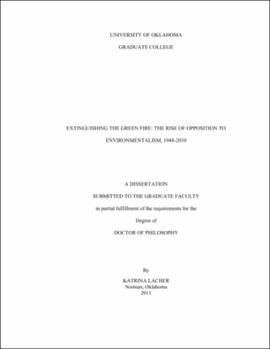| dc.description.abstract | This dissertation identifies the origins and characteristics of late-twentieth century opposition to environmentalism in the United States. I argue that a diverse set of critics cultivated a loose network of ideas, tactics, and arguments in order to challenge specific environmental measures as well as environmentalism more broadly. Though debates over environmental initiatives were about clean air, habitat protection, and wilderness designations, they were also fundamentally about competing visions of America's political and economic future. Politicians, industry representatives, business boosters, public intellectuals, and average citizens used critiques of environmentalism to promote an image of the United States as affluent, dominant, and orderly. Often capitalizing on the prevailing cultural and economic climate, anti-environmentalists reflected contemporary fears and desires. In short, throughout the second half of the twentieth and into the twenty-first century, environmental politics became a vehicle for debating the course of U.S. politics, culture, and economy. | |
